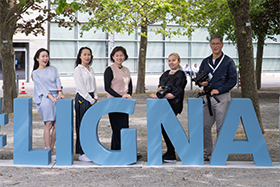FSC benchmarking responsible forestry

At the nursery in Lohara (L) women workers cultivate not just teak, but resilience. Each gloved hand (R) moves with purpose, placing roots that will one day hold the weight of a forest.
Teakwood is a coveted hardwood used globally for construction, furniture, flooring and heritage restoration. Yet its production often hides deeper costs – worker exploitation, chemical-driven nursery and plantation management, and biodiversity loss. The Forest Stewardship Council (FSC) sets internationally recognized standards to ensure that natural forests and plantations of teak are managed responsibly.
FSC-certified forests and plantations ensure fair wages, safe working conditions, and ecological safeguards, including designated high conservation value (HCV) zones and operations free from banned chemicals. By verifying every stage – from forests to the end user – FSC standards ensure that teakwood remains sustainable, traceable and ethically sourced.
Whether used in homes, public infrastructure, or construction sites, FSC-certified teak stands not only for quality, but also for traceability and accountability.
As part of this transformative approach to forest management, here we document FSC’s collaboration with the Forest Development Corporation of Maharashtra (FDCM) in central India.
Remembering roots
In the heart of Maharashtra, under the canopy of teak, lies a story of stewardship, of forests that breathe not just for biodiversity, but also for people, tradition, and a more responsible future.
The FDCM had had an enduring legacy of India’s FSC-certified forests, spread over 1,70,000 hectares of forests certified with care, integrity and vision. The nursery in Lohara is a quiet but vital node in the FDCM ecosystem where sustainability begins with quality seeds from known source.
Rows of teak seedlings stretch across beds nurtured with organic methods. The light here reveals more than the plants; it reveals the purpose. Under soft morning light, workers delicately pot seedlings, water rows of teak saplings, and shade tender shoots from the summer heat.
These portraits echo resilience. Women in bright traditional saris transplant life. A supervisor inspects root moisture levels.
No prohibited pesticides here, only organic care and deep knowledge. These frames humanize sustainability, not as a policy, but as lived, daily labour.
The commitment to safe working conditions, equitable hiring, training and chemical-free practices is not just about compliance; it is about building trust with both people and planet.
Here, the future of FSC-certified, sustainably sourced teakwood is being cultivated every single day, with knowledge, care and dignity.

Crafted with intent, the wood begins its final journey, from forest to form and from effort to offering.
Registry of accountability
The journey flows next to a richly biodiverse landscape: Kanhargaon Wildlife Sanctuary, nestled deep in the Brahmapuri forest division. A designated HCV site, it reflects ecological integrity and quiet reverence. Dense teak canopies shelter delicate ecosystems, and the sanctuary’s calm terrain speaks to years of careful management.
These visual testimonies highlight not just natural resilience, but the importance of preserving intact habitats. FDCM’s forest management under FSC certification ensures that these ecologically sensitive zones are maintained with respect, for wildlife, for workers, and for long-term conservation.
From nursery to nature captures plantation sites in the Junona range. Expansive teak lines etched across the terrain; gloved hands doing the daily jobs and protecting saplings. Workers sport safety boots, gloves, and hats – subtle, yet powerful symbols of occupational dignity.
These forests are not merely a source of timber; they are active, dynamic systems of biodiversity, livelihood and carbon sinks.
The narrative then moves to Ballarshah, where wood finds identity. This depot transforms standing teak into stories of origin, quality and traceability. At the depot division’s sawmill, stacks of certified logs are measured, graded and tagged.
Photographs document each step of traceability – from log markings to digital inventory scans. Men in uniforms check FSC stamps while forklifts arrange timber for auctions. This isn’t just industry – it’s responsible forestry in motion.
Here, wood doesn’t just wait for auction; it carries a biography. Responsibility that was once invisible now moves with every plank. Every piece of processed wood has a history – when it was felled, from which plot, under which regulation.
The timber yard becomes not just a place of trade, but a registry of accountability. This traceability ensures that buyers, whether local artisans or global dealers, know exactly where their quality teakwood comes from. Accountability, once invisible, now moves with every plank.
Product, promise
The journey concludes in crafted form: teak shaped by time, care and certification. Once-tender seedlings cradled in Lohara now live on in the craftsmanship of homes, government institutions, and infrastructure projects that bear the stamp of sustainable origin.
These final photographs feel still, almost reverent – like signing off a long letter with deliberate care. The forest’s journey, from sapling to timber, is complete. And because of FSC certification, every step – from soil to shelf – is transparent, traceable and accountable.
From heritage restoration landmarks like the new Parliament building and Prime Minister’s Office to revered sites such as Ayodhya’s Ram Mandir, the wood that began its quiet life in nurseries now upholds structures that embody cultural identity and national resolve.
This journey – from nurturing nurseries to sacred spaces – traces a complete circle of meaning. It reflects a philosophy of forestry that respects what grows, who nurtures it, and who it ultimately serves. Under FDCM’s stewardship, Maharashtra’s forests are not being used, they’re being entrusted.
Its operations ban child labour, promote safety and equity, and engage communities. Behind every image is a deeper structure, one of ethical labour, gender inclusion, and ecological empathy.
And that trust is visible in the pristine forests of Kanhargaon, in the steady hands of Lohara’s nursery staff, in the safety gear of forest workers, in the codes etched into timber at Ballarshah.
Forests don’t grow alone; they grow with us, for us, and (if protected well) beyond us. This is the legacy of responsibly managed forests: where sustainably sourced, FSC certified quality teakwood becomes both a product and a promise.
For more information, visit https://asiapacific.fsc.org/fsc-india, or write to india@fsc.org
Comments

- European symposium highlights formaldehyde emission limits
- Egger adopts holistic approach to waste management
- Taiwan’s Woodworking Machinery Industry Captivates Global Media on Opening Day of LIGNA 2025
- Coming of age of sustainability
- Intelligent packing line, sander from Woodtech
- Ornare introduces 5 new leather decors
- Richfill Edge Coat offers safer plywood finishing
- Jai’s Optimus range stays ahead of the curve
- Merino’s Acrolam sets new benchmarks in elegance
- Pytha 3D-CAD: where precision meets production
- Raucarp edge bands: simple, affordable
- Greenlam scores a 1st: High Quality Product Award
- Häfele turns space solutions provider
- Hettich bets on intelligent motion for evolving interiors
- Praveedh taking desi innovation to the global stage
- Turakhia shows off its Natural Veneers range
- Egger continues to ‘inspire, create, grow’
- Blum turns heads with new drawer, hinge systems
- FSC benchmarking responsible forestry
- At 100, Festool powers new solutions
- Door manufacturing on cusp of transformation
- AI-powered crib sings a universal lullaby
- In Full Bloom: Top brass at Blum takes a shot at burgeoning India market
- Elegant mathematics is bending the future of design
- Wood fibres weave new textile yarn
- Rolls-Royce icon: ‘most intricate woodwork ever’
- Felder’s long-term view to achieving excellence
- Tech in the future of furniture manufacturing
- Exports from India on horizon: Juergen Koeppel, CEO, Leitz Tooling
- Pfleiderer adds value with digital ‘structure finder’
- Australian architects design for KEEPsakes
- Jump shot! Crafting the ultimate pool table
- Apple adopts CLT to cut building emissions
- Sustainable design at Hotel Hábitat 2025
- Vecoplan tailors waste wood processing at Schaffer Holz
- Dealer engagement goes digital
- How to refinish wood decks like a pro
- IWMMTA makes strong beginning in the East
- Feria Hábitat weathers unusual Spanish storm
- Interzum Guangzhou 2026: materials defining the future
- Forum Italy: Beyond Furniture, Towards the Future
- CIFF Shanghai: hub of design, innovation
- Interzum Jakarta debuts with strong connect
- DAIC to showcase Kerala’s prowess this December
- Events Calendar: Industry fairs to visit


































